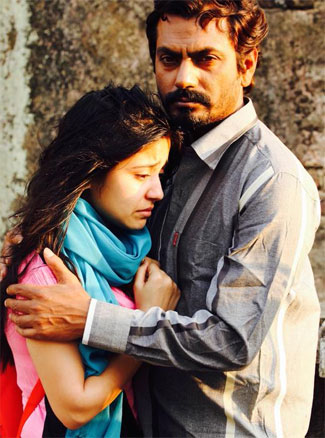 In a village in Gujarat, a married schoolteacher, Shyam (Nawazuddin Siddiqui), begins a relationship with one of his teenaged students, Sandhya (Shweta Tripati). Sandhya lives with her father, a policeman, who is often busy, leaving Sandhya to fend for herself, her mother having left them. Kamal (Irfan Khan), another student, is infatuated with Sandhya, a state that is encouraged and assisted by his best friend, Mintu (Mohd Samad). But Kamal’s infatuation is also fueled by the frustration he feels at Sandhya’s relationship with Shyam, which only he and Mintu seem to be aware of, at least early on.
In a village in Gujarat, a married schoolteacher, Shyam (Nawazuddin Siddiqui), begins a relationship with one of his teenaged students, Sandhya (Shweta Tripati). Sandhya lives with her father, a policeman, who is often busy, leaving Sandhya to fend for herself, her mother having left them. Kamal (Irfan Khan), another student, is infatuated with Sandhya, a state that is encouraged and assisted by his best friend, Mintu (Mohd Samad). But Kamal’s infatuation is also fueled by the frustration he feels at Sandhya’s relationship with Shyam, which only he and Mintu seem to be aware of, at least early on.
Director Shlok Sharma has worked as an assistant to both Vishal Bhardwaj and Anurag Kashyap, and the influence of both these directors, particularly of Kashyap, can be seen in Haraamkhor. Small town life, gritty realism, a modern world that is encroaching at the edges (as symbolized by the windmills outside of town), and a dark sense of humour permeate the film. One of the students in Shyam’s tuition class wears a Shaktiman costume at all times – his costume stinks, Shyam comments at one point, but his mind is fresh, his way of encouraging his students to think.
In Haraamkhor, Sharma asks us to consider boundaries – most obviously, moral boundaries and their transgression; but also where the boundaries between childhood and adulthood lie. Kamal and Mintu seem like typical kids, innocent and mischevious on the one hand, yet all too aware of the adult world that they – Kamal in particular – want to be part of. There is such a painful contrast between what they know of that world (some of which is frighteningly accurate), and what their mistaken misinterpretations of it are (Mintu tells Kamal that if Sandhya sees him naked that she will have to marry him. This has them taking a picture of Kamal in his underwear, which Mintu cleverly covers with a pink paper heart, a picture that Kamal tries to give to Sandhya, who really wants nothing to do with him).
Explosive emotions simmer under the surface in this film, occasionally slipping as things become more desperate. With the gentle guidance of her father’s girlfriend, Neelu (who discovers the relationship, but doesn’t reveal it, preferring to treat Sandhya as an adult, and also protect her, probably aware that the consequences of having it revealed would be equally as devastating for Sandhya), Sandhya breaks free of this affair with a manipulative, selfish, immature man.
The performances in Haraamkhor are genuinely, incredibly fine. Irfan Khan as Kamal (previously seen in 2011’s Chillar Party), and Mohd Samad as Mintu (adding to his already impressive performance in 2011’s Gaddu) give the film a comic touch, their boyish antics highlighted by the background score. Shweta Tripati impresses as Sandhya, swinging between a young adolescent on the verge of womanhood, often taking the lead in the relationship with Shyam, and the little girl she is so close to leaving behind, enjoying an ice cream and teasing Shyam. Nawazuddin Siddiqui is probably Hindi cinema’s most reliable actor, as well as one of its most talented, and his performance as Shyam is almost breathtaking in its subtlety and complexity. Siddiqui does something that would seem unthinkable – he takes someone who is, frankly, more immature than any of the children he teaches, who is manipulative, who is selfish, and he makes me feel almost – almost—sorry for him. This is a man who is so emotionally broken that his only way to express his anger is to lash out at others and throw tantrums (the scene where his wife leaves him after discovering his affair, where he swings between begging her to stay and cursing her could have ended up ridiculous without Siddiqui’s deft touch), and whose only meaningful relationships seem to take place with adolescent girls (his own wife is barely older than his students – and, as she reminds him, she was once one of his students, like Sandhya).
Childhood is such a fragile thing, it’s almost surprising sometimes how many of us survive it. Our bones break, our hearts break, and yet, for most of us, they heal, and we manage to grow up to become healthy, responsible adults. In Haraamkor’s world, however, not everything is so easy nor so neat, and what Shokla delivers is a punch to the gut just at the moment when things begin to look hopeful.









